
JULY 1, 2022 — Chemistry professor Aimin Liu has been awarded a three-year, $495,000 Accomplishment-Based Renewal (ABR) grant from the National Science Foundation (NSF) to advance his research on the body’s metabolic processes using an innovative method that will improve the understanding of amino acids.
By gaining more knowledge about the chemical processes underlying the body’s metabolism, scientists could make new discoveries that change the way people think about health, food and their eating habits.
Liu’s research project will pursue protein-derived cofactor studies, investigations where a protein’s amino acid is substituted with an unnatural one. A cofactor is a chemical compound that is required for an enzyme to accelerate chemical reactions. It is often considered a “helper molecule” that assists or enhances chemical transformations within the body.
Although protein-derived cofactor studies were first conducted in genetics by Peter Schultz in 2001, Liu is applying the method to crosslink chemistry for the first time. This interdisciplinary approach will allow the UTSA researcher and his collaborators to strategically target a specific amino acid and gain a quicker and more thorough understanding of its function and purpose.
"This continued NSF support will allow my lab to continue to advance the understanding of the protein structure-function correlations using unnatural amino acid substitution through a genetic method,” said Liu, the Lutcher Brown Distinguished Chair in Biochemistry at the UTSA College of Sciences. “We are the first group to bring non-canonical amino acids incorporation through the genetic code expansion technology to a new field."
Liu's research career spans over 20 years and has focused on the body’s metabolism. His research expertise includes biosynthesis, enzymology and protein biochemistry. He leads the UTSA Metalloprotein Research Laboratory, which specializes in investigating how biomolecules use metals to perform chemistry necessary for life. His interdisciplinary research has been well-supported by the NSF, the National Institutes of Health, the Welch Foundation and other funding agencies.
As part of his research, Liu has been investigating cofactors that contain a cysteine-tyrosine crosslink, or chemical bond that has the ability to boost metabolic processes.
When a cysteine-tyrosine cofactor is added to an enzyme, it serves as a catalytic amplifier that speeds up the body’s metabolism. By utilizing metalloproteins—proteins that contain metals like copper and iron—some enzymes can program a protein-derived cofactor to help the body digest and metabolize food significantly faster.
"This research will lead to a better comprehension of the enzymes that control the body’s metabolism,” said Liu. “Their proper function is fundamental to understanding a lot of what we know today about nutrition and diseases such as diabetes.”
Liu and his team will work with undergraduate and graduate students to lend their expertise in studying the catalytic functions of proteins. These experiences will equip Roadrunners with the training they need to prepare for research careers in cutting-edge laboratories. It also aligns with UTSA’s strategic mission of offering classroom-to-career opportunities.
The NSF grant will also contribute to UTSA's mission of preparing the next generation of scientists by supporting outreach activities and curriculum development in the Department of Chemistry. It will enable new distant learning programs and training opportunities for local high school students.
The knowledge UTSA researchers gain from this research project will be shared in a series of video lectures named "LiveSlides" and published online.
Liu is one of the first UTSA faculty members to receive an ABR grant, a prestigious award that is reserved for the most distinguished researchers who make significant year-over-year contributions to a specific area of research. He has received five competitive NSF awards over the past decade including, "Cys-Tyr Cofactor in Iron and Copper Proteins,” which begins in October.
UTSA Today is produced by University Communications and Marketing, the official news source of The University of Texas at San Antonio. Send your feedback to news@utsa.edu. Keep up-to-date on UTSA news by visiting UTSA Today. Connect with UTSA online at Facebook, Twitter, Youtube and Instagram.
Move In To COLFA is strongly recommended for new students in COLFA. It gives you the chance to learn about the Student Success Center, campus resources and meet new friends!
Academic Classroom: Lecture Hall (MH 2.01.10,) McKinney Humanities BldgWe invite you to join us for Birds Up! Downtown, an exciting welcome back event designed to connect students with the different departments at the Downtown Campus. Students will have the opportunity to learn about some of the departments on campus, gain access to different resources, and collect some giveaways!
Bill Miller PlazaJoin us for an intimate evening of cocktails, conversation, and culinary inspiration with Pati Jinich, Emmy-nominated chef and James Beard Award-winning author. Enjoy light bites and signature drinks in the warm, modern setting of Mezquite as Pati connects with guests over her passion for Mexican cuisine and storytelling.
Mezquite Restaurant in Pullman Market, 221 Newell Ave., San Antonio 78215From inspired courses to thoughtful pairings and a rich sense of community, the Ven a Comer Signature Dinner is a night of shared meals, shared stories, and unforgettable flavor.
Stable Hall (Pear Brewery), 307 Pearl Pkwy, San Antonio 78215Come and celebrate this year's homecoming at the Downtown Campus with food, games, giveaways, music, and more. We look forward to seeing your Roadrunner Spirit!
Bill Miller PlazaThe University of Texas at San Antonio is dedicated to the advancement of knowledge through research and discovery, teaching and learning, community engagement and public service. As an institution of access and excellence, UTSA embraces multicultural traditions and serves as a center for intellectual and creative resources as well as a catalyst for socioeconomic development and the commercialization of intellectual property - for Texas, the nation and the world.
To be a premier public research university, providing access to educational excellence and preparing citizen leaders for the global environment.
We encourage an environment of dialogue and discovery, where integrity, excellence, respect, collaboration and innovation are fostered.